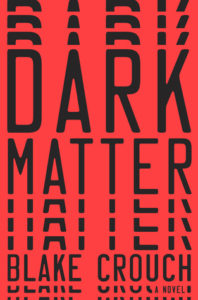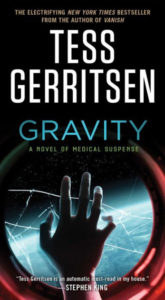Most popular articles for January 2024:
What is a sci-fi thriller novel, exactly? And how do you go about writing such a book? What makes these books different from “regular” science fiction? What are some of the best examples of sci-fi thriller novels?
If you have any or all of the questions above, you’re in the right place! We’re about to take a deep dive into the exciting, and often mind-blowing, world of science fiction thriller novels.
What Is a Sci-Fi Thriller Novel?
So, what is a sci-fi thriller novel? In simple terms, it’s a thrilling work of science fiction. It’s the kind of sci-fi story that gets your pulse pounding, usually by putting the protagonist in a high-stakes, high-danger kind of situation.
It makes more sense when you consider the individual genres:
Science fiction is a genre of speculative fiction that usually deals with futuristic and imaginative concepts like space exploration, technology, parallel worlds, time travel, and extraterrestrial life. It’s known as the “literature of ideas” and often explores the potential consequences of scientific or technological advancement.
Thrillers are a type of novel novel that hold the reader’s interest by using intrigue, adventure or suspense. These books have exciting plots that often involve crime, espionage, double-crosses, etc. Plot twists and cliffhangers are common features found within thriller novels.
Sci-fi thrillers give readers the best of both worlds. You get the big ideas, exotic settings and futuristic concepts of science fiction, combined with the pulse-pounding excitement of a thriller. What’s not to love?
Examples: 5 Books in This Subgenre
Dark Matter, by Blake Crouch, is a good example of a sci-fi thriller. It combines science fiction concepts like the multiverse with the fast pace, danger and suspense of a traditional thriller novel.

Gravity, by Tess Gerritsen, is basically a germ outbreak thriller set in space. So it clearly falls into this category of novels. It also veers into sci-fi horror territory at times, as the outbreak spreads through the space station.
Robopocalypse, by Daniel H. Wilson, is another example of a sci-fi thriller novel. This book combines futuristic concepts like artificial intelligence with the excitement of a robot uprising against humanity.
Jurassic Park, by Michael Crichton, is one of the most commercially successful novels within the sci-fi thriller subgenre. This book is often labeled as plain old “science fiction.” And it certainly checks that box. But it also features high stakes and adrenalin-fueled moments that give readers a thrill ride.
The Martian, by Andy Weir, could also be considered a sci-fi thriller book — especially toward the end. The middle chapters mostly deal with the scientific problem-solving associated with survival on Mars. But the story gets more thrilling as it moves toward the climax.
How to Write a Science Fiction Thriller
Now that we know what a sci-fi thriller is, let’s shift gears and talk about the writing side of things. How do you write a sci-fi thriller novel? How do you combine these two genres in a way that engages and excites the reader?
For starters, you might want to check out this 10-point plan for writing good science fiction. It covers everything from character development to story structure, and it’s only about a 20-minute read.
To be clear: I don’t claim to be a master of the sci-fi thriller genre. I lean more toward the sci-fi horror neighborhood, in terms of the novels I write. Still, I’ve been writing and studying the craft for many years, and I’ve read dozens of science fiction thriller hybrids along the way.
Point being, I might have a tiny bit of wisdom to share with you, and you might find it helpful.
Here are five tips for writing a sci-fi thriller novel that engages your readers:
1. Identify the science fiction component first.
As the label suggests, sci-fi thriller books contain elements from both of their “parent” genres. However, when writing a science fiction thriller type of novel, you’re probably better off identifying the sci-fi component first.

What’s the “big idea” of your story? What kind of science fiction components do you plan to include, and how might they complicate things for the protagonist?
Answering these questions early on will make your novel easier to write. The sci-fi aspects of your book will require the most forethought and research. They’ll also shape the story much more than the thriller aspects.
For these and other reasons, it makes sense to start with the science fiction ideas when writing a sci-fi thriller.
Refer back to the five example novels above. Andy Weir spent a lot of time researching Martian habitats and survival, when writing The Martian. Tess Gerritsen likely spent much time researching the International Space Station for her novel Gravity. You’ve got to put in the work.
Science fiction novels tend to require a lot more research than mainstream literary fiction. The same goes for sci-fi thrillers. As a result, you might find it easier to work out the science fiction details of your novel first, before integrating the thriller components.
Here’s another way to think of it: Science fiction makes up the frame of your story. The thriller component is the sexy paint job.
2. Create believable characters we can root for.
Whether you’re writing a sci-fi thriller, a romance novel, or a cozy mystery, you want to develop authentic characters. All fiction genres can benefit from having believable characters.
I would argue this is even more important for science fiction stories. After all, sci-fi stories usually require the reader to suspend their disbelief in some way. So you have to give them something authentic and genuine to hang onto.
Believable characters will make the entire novel more believable. This in turn helps you engage your readers, to pull them into the story and sweep them along for the ride. It allows them to let go.
Science fiction novels might be based on current technologies and scientific knowledge. But they also take a huge leap into the unknown (especially when they include things like time travel, aliens, etc.). By developing believable characters, you’re helping the reader make this literary leap.
I’ve written a separate article on how to create believable characters in sci-fi.
3. Raise the stakes throughout the story.
We’ve covered some of the science fiction considerations when writing a sci-fi thriller. Now let’s look at some things you can do to make your story more thrilling.

High stakes are a classic feature of thriller novels and movies. In these types of stories, the main characters often face huge obstacles with life-changing consequences. In other words, they have a lot to lose.
In fiction writing lingo, this is referred to as “raising the stakes.”
Loss of life is one way to raise the stakes, when writing a sci-fi thriller book. But you could go beyond that as well.
Sure, that rapidly adapting space germ might kill your intrepid protagonist. And that’s certainly thrilling. But it would be even more thrilling if you raised the stakes, as the story progressed. Maybe the spacecraft is on a remote-controlled approach to Earth, and there’s nothing the character can do to change course. Maybe the thing onboard poses an existential threat to the entire human race.
In this example, the threat grows during the course of the story. The stakes get higher. And readers have even more reason to keep turning the pages.
Use your imagination. Play the “what if” game. Think about the biggest, most devastating consequence or outcome that might happen in your novel — and work backward from there.
4. Add some twists, turns, cliffhangers and revelations.
A mainstream science fiction novel doesn’t always need plot twists, cliffhangers and stunning revelations. But if you’re going to write a sci-fi thriller type of book, you’ll want to make full use of these devices. They can make your story more engaging and exciting for the reader.
Most thriller-style novels contain mysteries or questions that get answered along the way. In the beginning, the protagonist might not fully understand the threat he or she faces. In fact, it’s best that they don’t. This adds suspense and a sense of mystery to the story.
Cliffhanger-style chapter endings are another common ingredient in sci-fi thriller novels. The key here is not to overuse them. A huge revelation or cliffhanger at the end of every chapter can become tiresome. So use them sparingly.
Here are some good examples of reveals used within mystery and thriller novels.
You don’t have to include reveals when writing a science fiction thriller novel. Just understand the power they have. Some well-timed reveals (and resulting plot twists) might make your story more compelling for readers.
5. Build up to an explosive climax.
People who read sci-fi thrillers tend to have high expectations when it comes to the climax. They expect the climax to blow their minds and drop their jaws. They want fireworks.

When writing a sci-fi thriller novel, it’s your job to meet this expectation in some way. Your climactic “fireworks” can and should be unique to your story — as long they’re present.
This brings up another important topic. Pacing.
It’s important to pace your story so that you build up to the climax. You can have plenty of thrilling scenes that come before the climax, as long as they don’t overshadow it. The climax has to be the “big one” in terms of tension, action and importance.
Masterclass.com does a good job of defining the climax of a story:
“In literary terms, the definition of climax is the highest point of tension in a storyline, often depicted by a confrontation between the protagonist and antagonist. A climax resolves the main conflict of the story and is the moment the main character reaches—or fails to reach—their goal.”
When writing a sci-fi thriller, always remember the golden rule of literary climaxes. They have to be bigger and more exciting than everything that came before. Otherwise, you have structural flaws.
So there you have … a short guide on how to write a sci-fi thriller novel. I hope you found this article helpful and welcome your comments below.